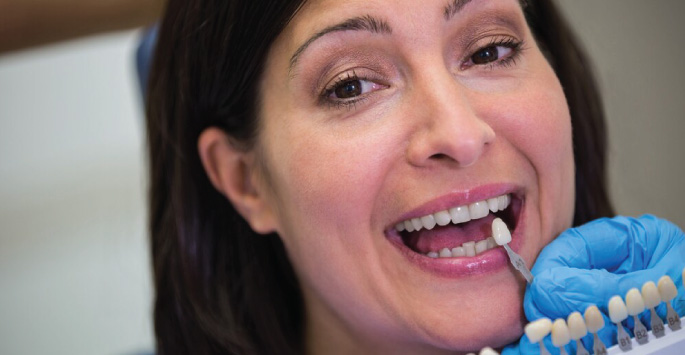
The holiday season is here. Houses light up the night sky. Seasonal songs greet us wherever we go. Mailboxes are flooded with sales offers.
For most people, it provides an opportune time for families to meet and share gifts. We play games, laugh, maybe argue a bit, but there is always plenty of food to eat. Family buffets brimming with sweets and casseroles and meats and treats.
When you see a blueberry cobbler or a fresh-baked apple pie, you are possibly thinking more about your taste sensations rather than your oral health. However, it is possible to make both happy.
Below are some tips to keep your teeth healthier this holiday season.
Avoid gummy, chewy, sugary foods.
Overindulgence is likely to happen during the holidays, but be selective. It’s easy to overdo certain snacks that can destroy our teeth.
Avoid or limit the following treats during this holiday season:
- Candy canes and other sour or chewy foods
- Crisps – these starchy treats can create acid in your mouth
- Ice – Chewing ice can cause enamel to break down.
- Carbonated drinks – Opt for a glass of water instead of Coca-Cola.
- Dried fruit – This contains far more sugar than you may think
In other words, choose items that aren’t bad for your teeth, such as sprouts, vegetables, and fruits. Turkey is another fantastic holiday food option since it contains nutrients good for your teeth, like phosphorus.
If you must eat biscuits this holiday season, try gingerbread, which contains less sugar than many other variations we’ve been accustomed to!
When it comes to beverages, opt for clear liquids. Red wine is known for discoloring your teeth and usually makes them feel sticky. Well, if you can’t avoid wine, try nibbling on cheese at the same time. The alkaline in the cheese usually balances your mouth’s PH level.
Up your dental health game
Do you always forget to brush or floss your teeth after a long night out? This is not the time to relax your oral health standards. Take some floss and toothbrush out with you, if necessary. This way, you’ll remember to brush your teeth right after a heavy meal or drink session.
Note: You should brush your teeth for at least two minutes and floss twice daily. This will spare you from costly dental bills after the holiday season. And if that has not persuaded you enough, try to think of how many more years of great Christmas gatherings you’ll be able to enjoy if you keep your teeth in good shape!
Drink plenty of water daily
The daily amount of water nutritionists recommend to drink is 11.5 glasses for women and 15.5 for men.
It is likely to binge on alcohol and consume large amounts of treats during the holidays while forgetting to drink water. However, this special liquid can make a significant difference to your oral health. Water, especially fluoridated water, prevents tooth decay and cavities.
It is highly advisable to drink water after eating. Usually, this helps get rid of bacteria left in the mouth. It also dilutes the acid from alcohol.
The last benefit of water is its unique ability to fill you up without adding calories. If you’re still hungry after dinner and considering having seconds, drink a glass of water instead. It’s beneficial to your waistline and teeth!
Don’t open gifts with your teeth.
This may seem obvious, but when an impatient kid hands you a toy, tightly sealed in Teflon-strength wrapping, your instinct will be to rip it open. Resist that temptation and grab a pair of scissors.
Teeth are handy in doing many things, such as chewing and enunciating. However, they do not make good cutting tools. Using your teeth to open packages and bottles erodes the enamel and weakens the edges of your teeth. This leads to tooth breakage and cracking and probably expensive cosmetic dental work.
Schedule your post-holiday dental check-up now
It is advisable to schedule a post-holiday dental cleaning and check-up before the holidays start. Note down your appointments somewhere, as this can easily slip your mind when juggling cooking, house cleaning, seeing family, and shopping.
Generally, there is an excessive demand for dental visits during the holidays; thus, booking in advance ensures you reserve a convenient appointment time. The sooner you can go for a dental cleaning and check-up, the less time your holiday indulgences will negatively impact your oral teeth.
Holiday dental care is very important.
When it comes to holiday dental care, prevention is definitely better than treatment. Developing a dental care routine is the most practical way to preserve your teeth this holiday season. But all said and done; do not overindulge in chewy, sugary snacks between meals and drink considerable amounts of water.
Article resources:
Information in this article has been gathered from multiple public health sources, including:


